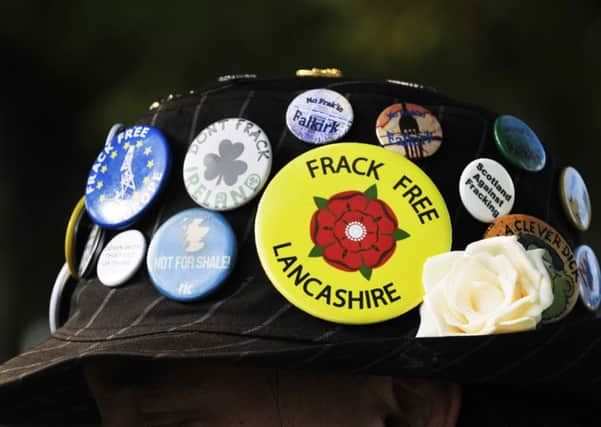Householders on alert to have say in fracking debate


The controversial issue of whether Unconventional Oil and Gas (UOG) development, mainly using the process of hydraulic fracturing or ‘fracking’, is ever allowed here has taken a step forward with the Scottish Government’s announcement public consultation will start in January.
The chance to debate the issue is certain to attract comment from thousands of householders across Falkirk district.
Advertisement
Hide AdAdvertisement
Hide AdTest drilling has already proved they are standing on billions of cubic feet of this natural resource and some people are more anxious to get it out of the ground than others.
Ineos Grangemouth is the holder of the largest number of shale gas drilling licences in the UK.
Its billionaire owner, Jim Ratcliffe, says the opportunity shale gas presents for energy and jobs for Scotland as well as the rest of the Union cannot be ignored.
Frustrated with the moratorium imposed 22 months ago by the Scottish Government that has stopped him drilling in the district, he has invested millions to build a fleet of tankers to ship ethane sourced from fracked shale gas thousands of miles away in the United States to Grangemouth.
Advertisement
Hide AdAdvertisement
Hide AdIt is now being used to manufacture the raw materials used in products from packaging to car parts, medical applications, construction and renewables.
He wants to get started, but will have to wait until the end of next year before the government decides.
Energy Minister Paul Wheelhouse has said: “Once the consultation closes and the results have been independently analysed and published, we will make our recommendations on the future of Unconventional Oil and Gas and allow Parliament to vote on it. After that the Scottish Government will come to a considered judgement.”
The evidence-based independent research which will form the basis of the public consultation covered key issues including the impact of unconventional oil and gas technologies, including hydraulic fracking and coal bed methane extraction, might have on public health, the economy and climate.
Advertisement
Hide AdAdvertisement
Hide AdIt also reported on work by the British Geological Survey on understanding and monitoring induced seismic activity and how the eventual decommissioning of any wells could be best achieved.
Which side of the ‘fracking fence’ you are on will dictate which order of importance these indicators are placed in.
The Health Impact Assessment by Health Protection Scotland involving NHS Scotland and Scottish Environment Protection Agency (Sepa) was asked to answer three specific questions - the potential risks to health associated with exploration for and exploitation of onshore unconventional shale oil and gas and coal bed methane; the wider health implications of deploying the technology; and the options to mitigate any adverse impacts identified.
After 22 months of fact finding it concluded: “There is inadequate evidence available to draw conclusions on whether development would pose a risk to public health.
Advertisement
Hide AdAdvertisement
Hide Ad“If unconventional oil and gas developments should proceed, although the evidence reviewed on UOG associated hazards, potential health impacts and wider health implications was lacking in quantity, quality and consistency, the evidence available would justify adopting a precautionary approach.”
Business experts KPMG produced three production scenarios based on estimates of potential UOG resources.
Its mid-range scenario estimated the development of 20 well pads of 15 wells each could supply 947 billion cubic feet of gas over the lifecycle to 2062 and lead to direct expenditure of £2.2 billion in Scotland, could give supply chain benefits and other induced economic benefits worth an additional £1.2 billion and create up to 1400 jobs in the Scottish economy.
At the top end of the scale it has been reported the boost to the economy could be as much as £6.5 billion and the number of jobs created could top 3000.
Advertisement
Hide AdAdvertisement
Hide AdThe government’s Committee on Climate Change also reported in detail to conclude: “If exploitation of UOG is to be pursued, it requires that a strong regulatory framework is put in place.
“Exploiting UOG on a significant scale is only compatible with Scotland’s climate change targets if emissions are limited through tight regulation, Scottish UOG production displaces imports rather than increasing domestic consumption and emissions from production of UOG are offset through reductions in emissions elsewhere in the Scottish economy.
“In terms of potential implications for global emissions, the overall emissions of Scottish UOG, if tightly regulated, is likely to be broadly similar to that of imported gas and that initial evidence suggests that tightly regulated shale gas production is likely to have a broadly neutral impact.”
Paul Wheelhouse said: “The government has adopted a clear and consistent approach to emerging technologies that could develop Scotland’s onshore hydrocarbon resources.
Advertisement
Hide AdAdvertisement
Hide Ad“The consultation, which will cover hydraulic fracturing and coal bed methane will not simply be an opinion poll – I do not believe that would do justice to the broad and complex range of issues that people care about and have to be debated.”